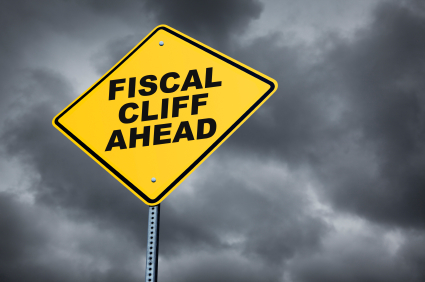What is the U.S. Fiscal Cliff?
The terms of the Budget Control Act of 2011 are scheduled to become effective at midnight on 31 December 2012. This will result in a 2% tax increase for workers, the end of certain tax breaks for businesses, the beginning of taxes related to health care law and deep automatic spending cuts. This would reduce the budget deficit by an estimated $560 billion or 3.7% of the $15 trillion US economy, however the Congressional Budget Office (CBO) estimates Budget Control Act would cut GDP by 4% and increase unemployment by at least 1% in 2013. The fiscal cliff is concerning investors and there is a strong possibility Congress won’t act until the eleventh hour.
The indecision is likely having an effect on the US economy as households and businesses “sit on their hands”. Walmart, for example, reported like for like US sales growth of only 1.5% for the three months to 31 October 2012. Their forecast for the three months to 31 January 2013 is for same store sales growth of between 1 percent and 3 percent.
MORE BY DavidINVEST WITH MONTGOMERY

Chief Executive Officer of Montgomery Investment Management, David Buckland has over 40 years of industry experience.
David is a deeply knowledgeable and highly experienced financial services executive. Prior to joining Montgomery in 2012, David was CEO and Executive Director of Hunter Hall for 11 years, as well as a Director at JP Morgan in Sydney and London for eight years.
This post was contributed by a representative of Montgomery Investment Management Pty Limited (AFSL No. 354564). The principal purpose of this post is to provide factual information and not provide financial product advice. Additionally, the information provided is not intended to provide any recommendation or opinion about any financial product. Any commentary and statements of opinion however may contain general advice only that is prepared without taking into account your personal objectives, financial circumstances or needs. Because of this, before acting on any of the information provided, you should always consider its appropriateness in light of your personal objectives, financial circumstances and needs and should consider seeking independent advice from a financial advisor if necessary before making any decisions. This post specifically excludes personal advice.

kick the can is what all do ( governments ) and that will happen.
deficit is more than 1 trillion, how long that can go on, no one know but will end at some point.
It seems to me that there will be significant unintended consequences stemming from the negotiations between Obama and Congress as they deal with the ‘looming fiscal cliff’.
The elephant in the room is of course that even if a deal is struck – and that means is the US government will be able to borrow another trillion or two in an effort to prevent asset value declines – there are demographic realities baked into the developed economies that guarantee demand is and will remain insufficient to justify future earnings and debt servicing even with a renewed round of borrowing a deal might deliver.
In other words, the marginal efficiency of additional debt is going to go negative. GDP will be unable to rise even with continued deficit spending and artificial demand creation.
A deal would be a boon for the banks and those close to the Central banks and government services and procurement agents, but not for the man in the street.
The 99% would be worse off and the 1% better off – yet again.
I shudder to think what this means for our bond and stocks markets and the transfer of wealth that would take place if, all of a sudden, the markets thought sovereign default brought about by inadequate free cash flow in the economy, was inevitable.